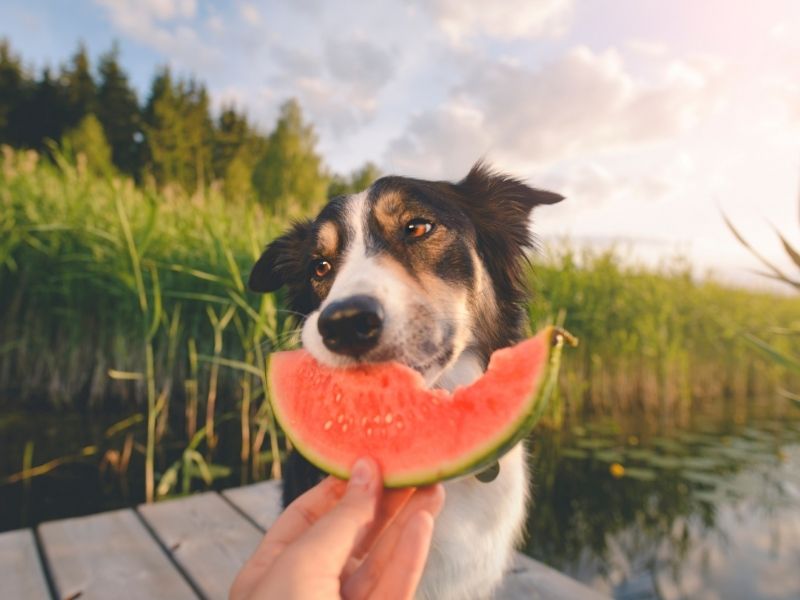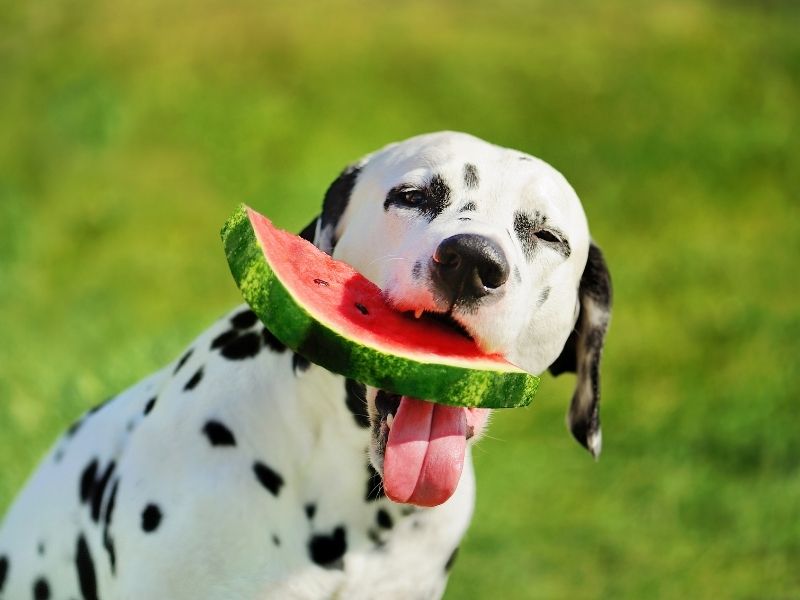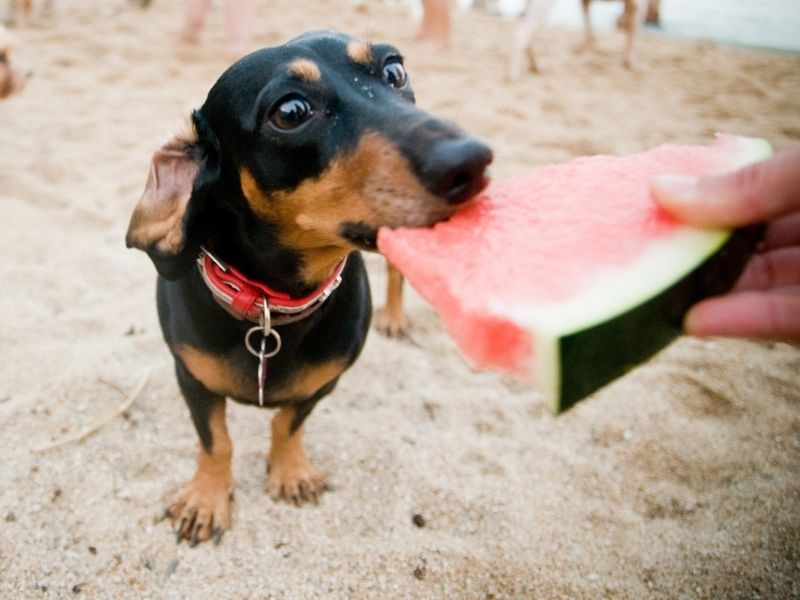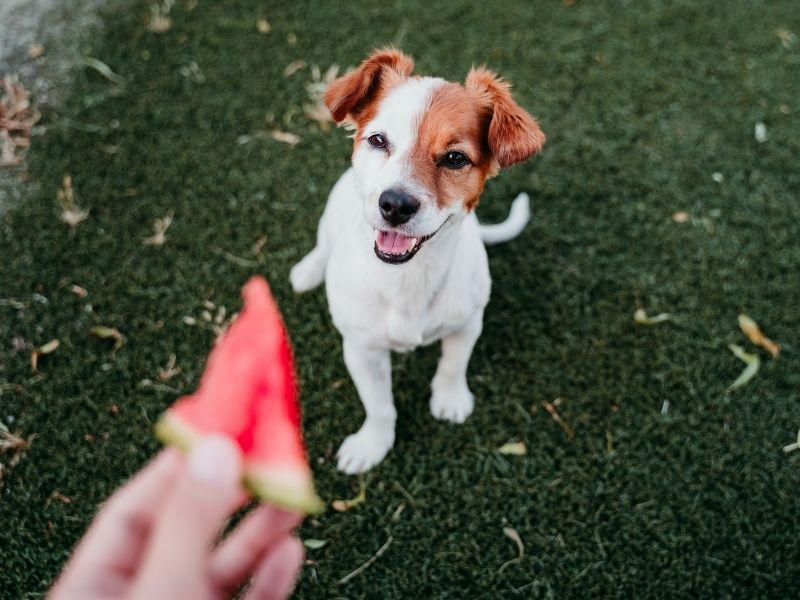Can dogs eat watermelon?
On a hot summer day, there’s nothing more refreshing than a cool, delicious slice of watermelon. Everybody wants a piece! This juicy treat contains plenty of vitamins, nutrients, and water, making it the perfect snack.
But can your dog eat watermelon alongside you? As jam packed with goodness as the watermelon is, there are still things to consider before offering your dog a bite.
Here’s what you should know about feeding watermelon to your dog.
Can dogs have watermelon?
Yes, dogs can eat watermelon!
This juicy fruit is a healthy and hydrating treat for your dog. It’s low in calories and packed with nutrients, making it an ideal addition to your dog’s diet.
However, there are both benefits and limitations to feeding your dog watermelon. It should be served in moderation and there are a few precautions to consider.

Is watermelon good for dogs?
Yes, watermelon is good for dogs. In fact, the Watermelon Promotions Board, a division of the USDA, considers watermelon a superfood.
The fleshy, pink fruit of a watermelon is loaded with healthy nutrients that are beneficial for our dogs, including:
- Potassium: Helps muscle development, supports healthy kidney and heart function, and aids in healthy bone density.
- Vitamin C: This antioxidant boosts your dog’s immune system, supports healthy aging, and reduces inflammation.
- Vitamin A: Supports vision and skin health, and helps power the immune response.
- Vitamin B6: This vital coenzyme is responsible for glucose generation, red blood cell and nervous system function, and hormone regulation, among other things.
- Fiber: Promotes healthy bowel movements, colon health, and relieves your dog of constipation. It also aids in weight management.
- Antioxidants: Repairs cells damaged from environmental stresses put on our dog’s bodies.
- Lycopene: This is what gives watermelon it’s beautiful red color. It’s also beneficial when it comes to cancer prevention and supporting vision in dogs.
Plus, watermelon is cholesterol and fat free, and low in sodium and calories. And of course, when your dog consumes fresh watermelon, you won’t have to worry about gross chemicals or preservatives, all things you might find in store bought treats.
Watermelon is also a good source of hydration, which is particularly important on hot days. Watermelon is, after all, made of 92% water!

Can dogs eat watermelon rind?
The most popular part of the watermelon is the red, sometimes pink flesh, but the truth is, the whole fruit is edible. This includes the green scraps that usually end up in the compost bin, also known as the watermelon rind, or watermelon skin.
While the rind on the outside of the fruit is completely edible, that doesn’t mean you should start breaking off pieces for your dog.
Despite being technically edible, the watermelon rind still isn’t exactly safe for your dog to munch on. It’s firm and can be difficult to chew.
Watermelon rind can be a choking hazard, especially if your dog swallows a large piece without chewing, and their digestive system may have a tough time breaking it down. This can lead to diarrhea, upset stomach, or intestinal blockage. Smaller dogs are particularly at risk.
If your dog does eat the skin of a watermelon, check for signs of an intestinal blockage, like vomiting, constipation, lethargy, and abdominal pain. If you notice any of these signs, get to your veterinarian right away to avoid serious complications.
Skip the rind and stick to the fleshy, red interior of the watermelon. It’s the juiciest and most flavorful part anyway!
Can dogs eat watermelon seeds?
Watermelon seeds can be a problem for dogs. While one or two seeds might not do much harm, ingesting too many seeds may cause an intestinal blockage. This is especially true for small dogs, who are more at risk for a blockage given their smaller intestines.
Avoid the risk by removing all of the seeds before giving your dog some juicy watermelon. If you’d like to go the easy, stress-free route, you can opt to give your dog seedless watermelon.

Can dogs eat watermelon with white seeds?
White seeds, often found in seedless watermelons, are really just immature black seeds. They’re soft and almost translucent because they’re just beginning to develop.
If your dog eats a few white seeds, they should be fine. Just don’t go overboard.
Can diabetic dogs eat watermelon?
Watermelon does contain sugar. However, the high percentage of fiber in watermelon acts as insulation for the sugar, which means it’s released into the bloodstream more slowly than your average fruit. It’s also mostly made up of water, and should not cause any unhealthy spikes in blood sugar.
Even so, if your dog suffers from diabetes, don’t feed them watermelon until you’ve consulted with your veterinarian first. They will be able to advise you on what’s best for your dog.

Can small dogs eat watermelon?
Yes, small dogs can eat watermelon. In fact, canines of all sizes can enjoy watermelon! Just be sure to cut the watermelon into small pieces so it’s not a choking hazard.
How much watermelon can my dog eat?
Watermelon is a refreshing, nutrition-packed snack, but just like with all foods, moderation is key.
Too much watermelon can cause an upset stomach, constipation, or diarrhea for your dog. Plus, since watermelon is high in sugar, it can contribute to the risk of obesity.
If you’re following the popular 90/10 rule – which we advise – where 90% of a dog’s daily calories come from balanced meals, and 10% come from treats, then your dog should be given watermelon only as an occasional treat. It should not be a part of their daily diet.
Feed your dog a few small chunks of watermelon, to avoid choking hazards, with the rind and seeds removed as a tasty, once-in-a-while treat.

How to feed a dog watermelon:
Here are a few safe ways to feed your dog watermelon:
- In chunks: Cut the watermelon into small pieces and remove the seeds and rind.
- Frozen: Remove the rind and seeds, cut the watermelon into small pieces, and freeze in a Tupperware or Ziploc bag. Watermelon is great as a treat on a hot summer day!
- Purée: Remove the seeds and rind and purée the fresh watermelon. You can serve up as a watermelon smoothie, or freeze the purée in an ice cube tray.
- Watermelon ice cream: Blend frozen watermelon chunks or purée with plain, unsweetened yogurt. This makes a refreshing, delicious dog-friendly watermelon ice cream. Be sure the yogurt has no added sugars, sweeteners, or flavors, and that Xylitol isn’t listed in the ingredient list.
- Dehydrated: You can dehydrate watermelon, minus seeds and rind, for a chewy treat. This will eliminate the hydrating properties of the fruit, but your dog will still enjoy it.
Remember – always consult with your veterinarian before introducing any new foods into your dog’s diet. They’ll be able to tell you if watermelon is ok to feed your dog, and give helpful advice on portion size and feeding frequency.
Here are a few other tips and tricks for those of you who want to incorporate watermelon into your dog’s treat diet:
- Have a small dog? A melon baller is a great way to scoop out small, bite sized pieces of watermelon for your dog to eat.
- When you can, buy organic watermelons, so you and your dog both stay away from synthetic (human-made) pesticides, herbicides and fertilizers.
- Eliminate the hassle of seeds and buy seedless watermelons.
- If your dog has dental issues, purée the watermelon before serving.

Will watermelon make my dog poop?
Eating watermelon can cause loose stool if your dog eats too much at a time. No one wants to deal with a bout of doggy diarrhea! Just be sure to feed your dog watermelon in moderation, and they should be fine.
Also, keep in mind that watermelon has a super high water content, meaning your dog may experience increased urination after eating it. Follow the watermelon snack up with a nice walk so your dog can relieve themselves.
Will watermelon make my dog’s poop red?
No, watermelon will not make your dog’s poop red. If your dog is healthy, their poop should come out a normal color and consistency, even after eating watermelon, as long as it’s fed in moderation.







